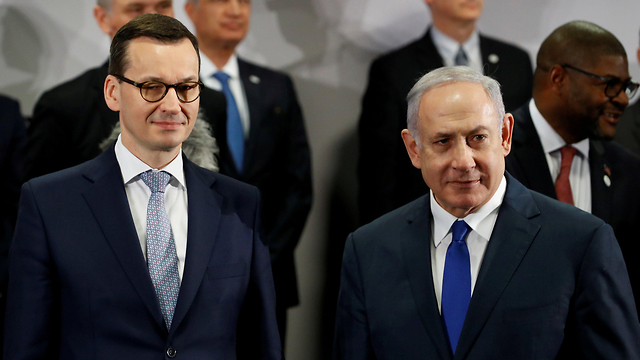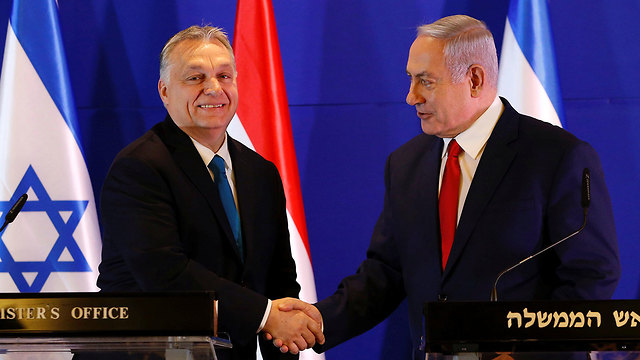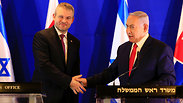
Poland says still awaits Israel's apology in Holocaust row
Polish diplomat says Warsaw will 'leave it Israeli leaders to choose what form of reaction they will have', after spat ends in cancellation of international conference; Hungarian leader calls for end to dispute
Poland is still awaiting an apology from Israel over comments made by acting foreign minister Yisrael Katz regarding the role of Poles in the Nazi Holocaust, said Polish Deputy Foreign Minister Szymon Szynkowski vel Sek on Tuesday.
"We leave it to Israeli leaders to choose what form of reaction they will have and who will react, but it should be a unified and definite one," Szynkowski told reporters.
Poland withdrew from a formal gathering of the central European Visegrad Group of countries set to take place Tuesday in Israel after Katz said that "many Poles" had collaborated with the Nazis in World War Two and shared responsibility for the Holocaust. He also referenced a quote from the late former prime minister Yitzhak Shamir, who said that Poles "suckled anti-Semitism with their mothers' milk."
Poland's Prime Minister Mateusz Morawiecki announced Sunday that he was pulling out of the summit and canceled Polish participation altogether the following day after the remarks from Katz, which he denounced as "racist" and "absolutely unacceptable."
The summit was then cancelled, and the leaders of the other Visegrad countries — Hungary, Slovakia and the Czech Republic — travelled to Israel for individual, bilateral talks with Netanyahu.
The first gathering outside Europe of the Visegrad group was supposed to be a crowning achievement for Netanyahu in his outreach to central and eastern Europe to counter the criticism Israel faces in international forums over its policies toward the Palestinians.
In place of the summit, Netanyahu held back-to-back meetings with Slovak Prime Minister Peter Pellegrini, Czech Prime Minister Andrej Babis and Hungarian Prime Minister Viktor Orban before hosting all three for lunch at his official residence.
But hovering over it all was the absence of Poland, the fourth member of the group. In brief comments alongside the three visiting leaders, Netanyahu made no mention of the elephant in the room, focusing instead on a range of joint economic, technological and cultural projects.
Hungarian Prime Minister Viktor Orban urged Poland and Israel on Tuesday to resolve their dispute.
"I think it would be better that they would be here, and we have good friendship with Poland, as you know ... and we have good friendship with Israel," Orban, asked by a reporter if he was disappointed by Poland's absence, said after meeting Netanyahu.
"When you have two friends having discussions with each other the only hope you can have is that they will talk directly with each other and improve the situation. That's my hope also."
Netanyahu, who was standing at the podium with Orban when the question was asked, did not respond directly, saying only that the Hungarian leader was a "superb diplomat."
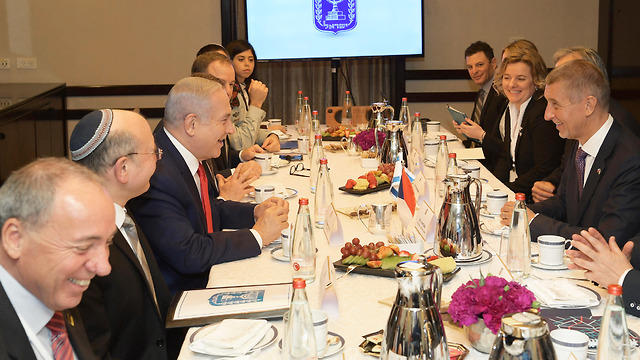
The diplomatic row has been escalating since Friday, when some Israeli media reported remarks by Netanyahu in which he appeared to accuse the Polish nation of involvement in the Holocaust..
Netanyahu's office said he had been misquoted in his response to a reporter's question during a visit to Warsaw about Polish legislation related to Holocaust remembrance, and that he had not cast any blanket blame. Many Poles refuse to accept research showing thousands of their countrymen participated in the Holocaust in addition to thousands of others who risked their lives to help the Jews.
Many of the six million Jewish dead perished in camps in Poland during its occupation by Nazi Germany.
Tensions between Israel and Poland rose last year after Poland's nationalist government introduced new legislation that would have made the use of phrases such as "Polish death camps" punishable by up to three years in prison. After pressure from the United States and an outcry in Israel, Poland watered down the legislation, scrapping the prison sentences.
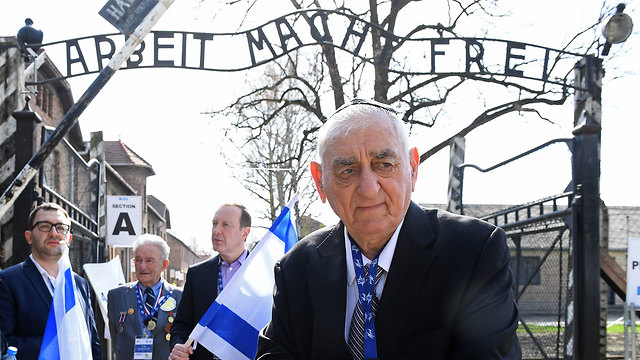
Poland has been quick to denounce anyone accused of linking the country to the well-documented history of anti-Semitism and violence against Jews that took place there during and after the wartime Nazi occupation. Israeli officials see Poland's controversial legislation as an attempt to suppress such discussion, and Netanyahu has faced criticism from historians in Israel for not opposing the law, which critics say distorts history.
Netanyahu has also come under fire for seemingly catering to the leaders of Lithuania, Ukraine and other countries who have engaged in selective World War II-era commemorations that play down their countries' culpability while making heroes out of anti-Soviet nationalists involved in the mass killing of Jews.










